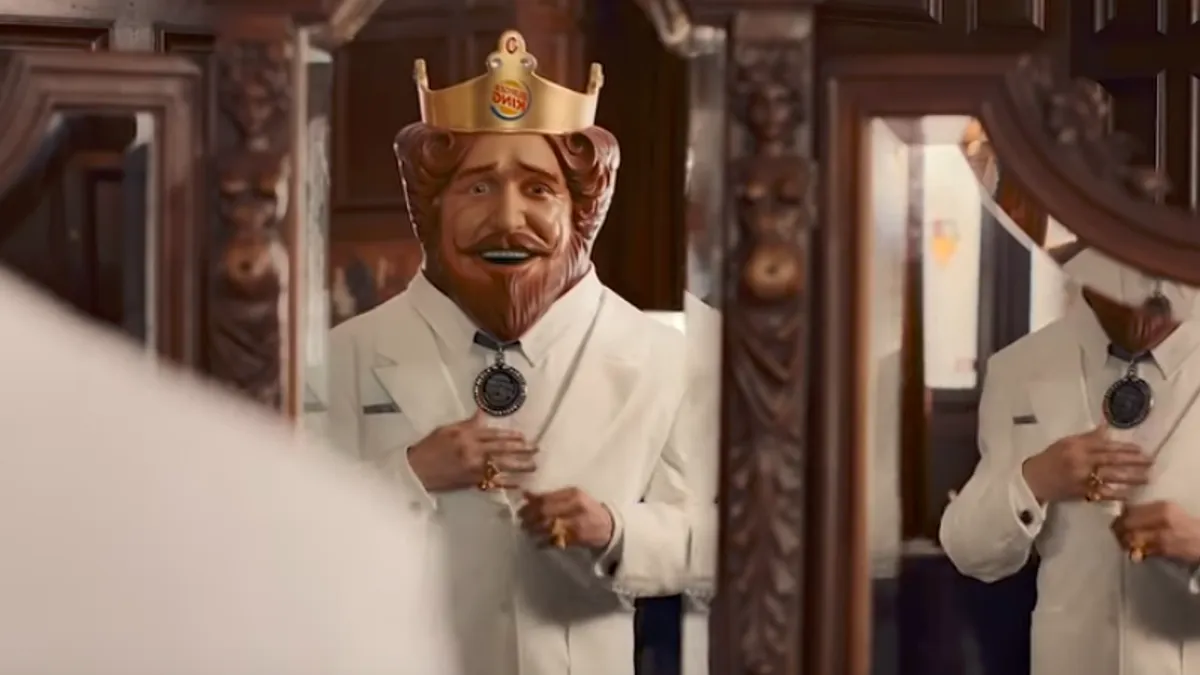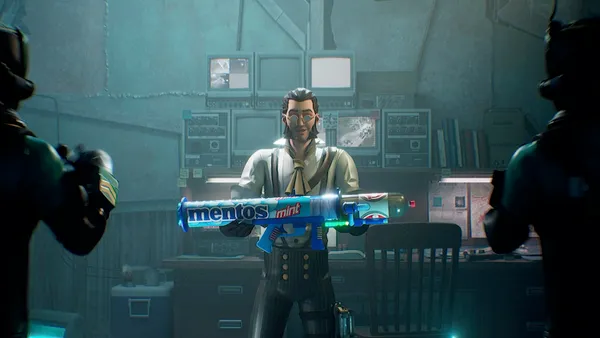Dive Brief:
- Burger King this week debuted a fresh look for its King mascot, the "K.F.G.," or King of Flame Grilling, as a way to promote a new grilled chicken sandwich menu offering, according to a press release.
- A video ad shows the King getting dressed up in a white suit and features the line, "when it comes to flame-grilling, a king always outranks a colonel," an obvious ribbing of KFC's brand mascot Colonel Harland Sanders. Select restaurants will serve the grilled chicken sandwiches in limited-edition "K.F.G." wrappers as well.
- At the same, KFC has unveiled the latest iteration of Sanders: Colonel RoboCop, described in a news release as "the ultimate law enforcer," matching the RoboCop character's persona in the movies from where he originates. In a narrative around the campaign, KFC has tasked Colonel RoboCop with carrying a triple-encrypted copy of KFC's signature blend of 11 herbs and spices recipe to the Bahnhof maximum security nuclear bunker in Stockholm, Sweden — one of the highest-security vaults in the world. Colonel RoboCop will appear in a new series of ads promoting KFC's Fill Up menu items.
Dive Insight:
In a highly competitive fast-food category, KFC and Burger King have frequently attempted to use disruptive marketing to stand out and win over the favor of younger consumers like millennials, including through the use of their recognizable mascots. While the timing of the latest campaigns is possibly coincidental, the idea of Burger King taking a stronger jab at KFC at the same time that the fried chicken chain is launching a campaign around protecting its secret recipe could make for a compelling narrative for consumers to follow.
Beyond the marketing creative, Burger King isn't typically a direct competitor to KFC, being more focused on burger rivals like McDonald's and Wendy's. But the launch of a grilled chicken offering shows how those lines are possibly starting to blur. KFC, for its part, has pushed further onto the turf of companies like McDonald's and Chick-fil-A by ramping up its sandwich offerings, including through the debut of an item called the Crispy Colonel last year.
The dueling campaigns additionally serve to highlight how Burger King and KFC, which are frequently praised for their marketing, tackle the idea of disruption differently. Burger King continues to troll competitors and tap into trends through what it calls "hackvertising," where it can hijack rivals' marketing efforts and trending pieces of news to further its brand.
Recently, Burger King ribbed McDonald's for losing its Big Mac trademark in the EU by rolling out a line of menu items called "Not Big Macs" in Sweden. It also went after McDonald's through a geolocation stunt that offered smartphone users who downloaded the revamped BK App and got within 600 feet of McDonald's locations a Whopper for a penny. The "Whopper Detour" campaign helped to drive more than 1 million app downloads, according to CMO Fernando Machado.
KFC, on the other hand, has found a winning strategy by continuing to iterate on Sanders as a mascot, tapping a expansive cast of actors, athletes and more to fill the role. With the latest push, the brand is vying to stoke consumer nostalgia for '80s and '90s pop culture through references to the "RoboCop" franchise.
Bringing the Colonel back in 2015 as a mainstay in its marketing has been a successful way for KFC to reconnect with younger consumers, who have previously strayed from fast-food brands, James Quinlan, foodservice analyst at the firm GlobalData, previously told Marketing Dive.














